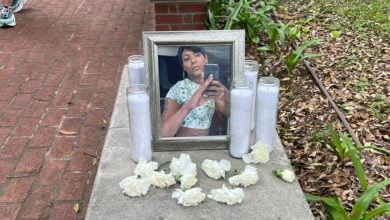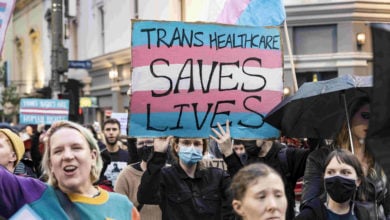In Florida, anti-transgender bill 583, known by many as the “bathroom bill,” recently made its way out of the House Civil Rights Subcommittee with a 9-to-4 vote. Like bills in Kentucky and Texas, the proposed law would make it illegal for transgender people to use public facilities that correspond with their gender if it is different from the one assigned to them at birth.
The bill has sparked several protests and been met with vocal resistance by the trans community and supporters of human rights. Liberation spoke with several people to hear their thoughts on the bill.
Lauren Brenzel, a 23-year-old living in Sarasota, told Liberation how the bathroom bill is both transphobic and a threat to public safety.
“It’s very thinly veiled transphobia,” said Brenzel. “It’s especially offensive because it’s claiming to be something that protects women when really it’s putting some of the most vulnerable women in an even more vulnerable situation by forcing trans women to use restrooms they don’t identify with. And we know that cis men are particularly likely to commit violence against trans women. So it’s a huge concern for public safety in the state that a bill like this would be passed.”
Brandi Branson of Trans Support Network of West Central Florida told Liberation how the bill, though a serious matter, serves primarily to distract attention from proposed legislation that would offer substantive protection to trans people.
“The ‘bathroom bill’ is pernicious in the sense that it’s really a distraction,” said Brandi. “Yes, it could be lethal, it could be very
difficult. But it’s so draconian in its structure and bigoted in its writing, that there’s no question that it won’t succeed. But it is a distraction, because the real issue is getting the bill passed called the Florida Competitive Workforce Act, which would put our civil rights into Title XII and guarantee us rights equal to anyone else in the state of Florida.
“The Florida Competitive Workforce Act is designed to guarantee the right of transgender people to be free from discrimination at work, being fired, or being harassed on the job, but even more than that, it affects all facets of life. We’re trying to add four words to Title XII: ‘gender identity’ and ‘gender expression.’ And those four words would cover basically the needs of the transgender community and its variants and it would then bring us into a place where we have genuine equality with the rest of Florida.”
Branson sees a long road ahead in the fight for trans equality, but believes the enactment of federal and state protections is achievable.
“In reality we’re going to keep having these kinds of things come up until we get established as a real people. The problem right now is we’re viewed as a non-people by most factions of society, even in the gay and lesbian community, so consequently our rights are very thin at best. Until we get this done, hopefully at the federal level but certainly at the state level, we’re going to continue to have these types of entrapments.”
Dr. Emily Fairchild, Associate Professor of Sociology at New College of Florida, spoke to Liberation about her reaction to HB 583, as well as the nature of sex and gender. Fairchild teaches classes such as Sociology of Gender and the Body, Queer Studies and a number of other gender related courses.
“[The bill] is discriminatory in that it only addresses trans people. I think it’s ignorant in that it references biological definitions of sex that are really problematic given how people actually conceptualize gender and how they live their lives as gendered people. And that’s why the bathroom issue is an issue, because it’s a physical space that’s usually segregated and designated and it’s a reminder of the fact that our society is organized by sex,” said Fairchild.
Fairchild also spoke about the term “trans” and how it underscores how concepts of gender have changed from how many understood them in the recent past.
“A common way that the way the word ‘trans’ is being used right now is to use it with an asterisk. Trans* emphasizes the fact that trans is an umbrella term. It can refer to someone who has actually had what in the past has been named ‘sex change surgery,’ and that might be what folks might see as the most ‘extreme’ form of being trans. It could reference something from having actual complete sex change surgery, to partial, to presenting as a man if you were born as a woman, or presenting as some form of genderqueer, so just challenging what people might expect of you, that might be gender ambiguous, androgynous, expressing both a masculine and a feminine presentation or different presentations on different days, or it might be ambiguous such that your goal is that people cannot necessarily place you. All those identities could be considered trans identities,” said Fairchild.
“Society used to think that there was a direct connection between sex and gender, that when you’re born, you’re labeled a boy or girl and then you grow into a man or woman. And that’s based typically on genitals, although it might be based on hormones or on chromosomes. The problem is,” said Fairchild, “that these all come in different kinds of combinations and they might not all line up perfectly in the way that fits that conventional definition of what a man or woman is. So science has come a long way in
identifying the fact that, actually, sex is a lot harder to define than we used to think. It’s not that easy to categorize someone as male or female. There’s not necessarily this one on one relationship between sex and gender. That’s what trans* makes clear and that’s what sex segregated bathrooms tries to force on us, which just doesn’t really fit with how people are living their lives.”
Liberation also spoke to Milo Bickel, a New College student who is dfab (designated female at birth) trans and genderfluid. Bickel explained that HB 583, based on dangerous myths, threatens to increase an already startling homicide rate against trans people.
“The new law is an act of violence from the state and the deaths that can come from this is blood on the hands of the legislators. The homicide rate against trans people, these numbers made mostly up of trans women of color, is one in 12, and there’s no way those numbers can get any lower if legislation forcing trans people into unsafe situations will [pass.]
“There’s literally never been an instance of a trans person committing an act of violence against a cis person in a restroom, so the narrative of predatory trans people—generally the narrative of the ‘man in the dress’ looking to attack women in their safe space—is completely unsubstantiated, transmisogynistic, and contributes to the deaths of trans women who are attacked by cis people.”
Bickel spoke about the importance of gender neutral restrooms.
“Having access to gender neutral restrooms around my campus has improved my psychological wellbeing and reduced the anxiety and dysphoria that accompanies using a gendered restroom and if I’m presenting masculine saves me the trouble of choosing between the dangers of using a gendered restroom at all.”






